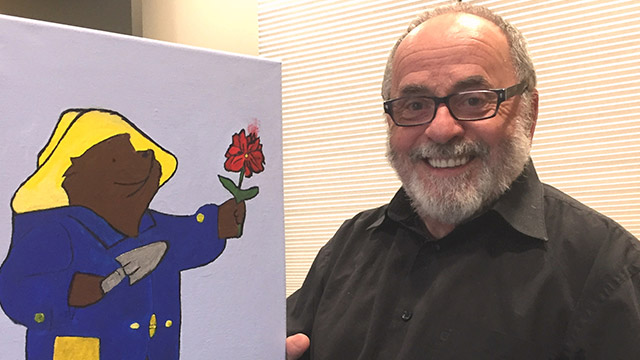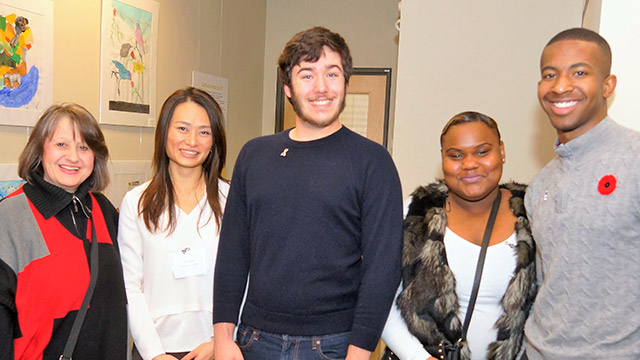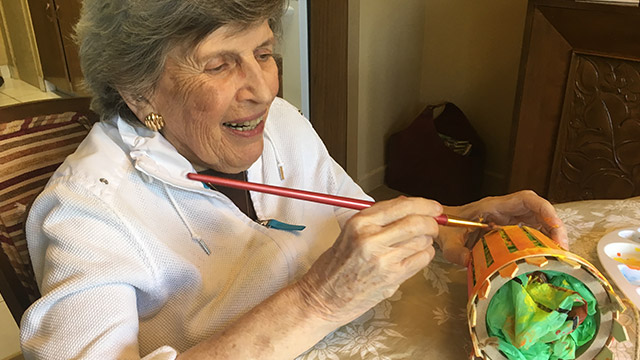HELPING YOU LIVE WITH THE DISEASE!
I LIVE WITH DEMENTIA AND THE ALZHEIMER SOCIETY OF MONTREAL IS THERE FOR ME
Do I have Alzheimer’s disease?
Memory impairment is common in people aged 65 and above. In fact, 40% of this age group experience memory impairment in some form or another! When not caused by a medical condition, this is known as “age-associated memory impairment.” Alzheimer’s disease and related forms of dementia, however, do not fall under this category.
Normal Aging or Dementia?
Here are a few differences between dementia and age-associated memory impairment.
Age-Associated Memory Impairment |
Dementia Warning Signs |
| Forgetting a past conversation or event (a year or more ago) | Forgetting a recent conversation or event |
| Forgetting the name of an acquaintance | Forgetting the name of a family member |
| Difficulty finding words from time to time | Difficulty finding words frequently and making substitutions |
| You are concerned about your memory, but your friends and family are not | Your friends and family are concerned about your memory but you are not |
N.B. The table above is not a diagnostic tool.
What is Alzheimer’s disease?
Alzheimer’s disease causes an irreversible degeneration of brain cells, affecting memory, emotions, mood, concentration, and communication. Alzheimer’s disease is progressive and is not part of a typical aging process.
Related forms of dementia
The term “dementia” is used to describe symptoms produced by physical changes in the brain that are caused by a disease or other factors. Alzheimer’s disease is the most common cause of dementia. Other forms of dementia are similar to Alzheimer’s disease in that they are progressive and cause the irreversible degeneration of brain cells. They are often grouped together under the terms “related forms of dementia” or “related disorders.” There are many “related forms of dementia” and you may know some of them, e.g. frontotemporal dementia, Lewy body dementia, etc.
The Stages of Alzheimer’s Disease
Alzheimer’s disease and related forms of dementia are progressive and lead to the degeneration of brain cells. In general, the disease progresses slowly, however, the speed of its progression varies from person to person. The following is is an overview of each stage of the disease to help you better prepare for the journey ahead. Please note that symptoms may not appear in the order summarized below, and that the duration of each stage is, in itself, variable.
Early Stage
Middle Stage
Many everyday tasks— e.g. shopping, dressing, bathing, etc.— require more and more assistance. At this stage, some people with dementia retain a level of awareness of their condition and caregivers help them maintain their autonomy by focusing their efforts on preserving their current abilities.
Late Stage
At this stage, full-time care may be required to ensure optimal quality of life for the person living with the disease.
End of Life
At this stage, the care provided aims to fulfil the physical, spiritual, and emotional needs of the person with dementia, whose cognitive and physical capacities will be greatly reduced.
Services for People Living with Dementia
Individual Consultations
Free professional counselling services are available for people living with Alzheimer’s disease, Mild Cognitive Impairment, or a related form of dementia.
This service is designed to address your individual needs and to help you adapt and cope with the challenges and changes associated with your diagnosis.
Information, support, and resources are available.
Connect with a counsellor now.
For more information and organize a consultation:
Art Therapy
Through this activity, people living with dementia have the opportunity to express themselves and enhance their well-being.
The workshops provide meaning to the present moment and allow participants to maintain their dignity.
No previous artistic experience is required!
For more information and to register:
Laughter Yoga
The “What Connects Us” research program offers people living with dementia and their caregivers the opportunity to participate in a weekly hour of laughter yoga via Zoom!
Learn the benefits of laughter for the mind, body and soul. Join us dressed in comfortable clothes and shoes, and don’t forget your water bottle!
No previous yoga experience required!
For more information and to register:
Creative Dance
This dance and movement workshop is offered by the National Centre for Dance Therapy, a division of Les Grands Ballets Canadiens, and adapted for people living with dementia and their caregivers. Get moving in the safety of your home, explore your creative potential and challenge the limits of your body!
Join us dressed in comfortable clothes and shoes, and don’t forget your water bottle!
No experience is required!
For more information and to register:
Art Links
The Art Links program is a partnership between the Montreal Museum of Fine Arts Sharing the Museum program and the Alzheimer Society of Montreal.
The format of our monthly visit to the Montreal Museum of Fine Arts has been adapted to respect the current physical distancing guidelines. The visits will now take place online!
For more information and to register:
Tales and Travels
Participants in the Tales and Travels program and their caregivers explore different countries by using books and objects, reading aloud, listening to music, and other similar activities.
The aim of the Tales and Travels program is to encourage interaction, conversation, and expression through travel-oriented discussions.
Weekly Meet-Ups
Every Monday and Friday afternoon, you are invited to join this social program for people living with Alzheimer’s disease or a related form of dementia.
Come and share in discussions, participate in physical activities, and stimulate your brain through cognitive exercises, and other creative activities.
Information and Support Groups
At these groups, you will learn about Alzheimer’s disease and related forms of dementia, as well as strategies for autonomous living.
You will also learn how to navigate the health care network and find the resources available in the community.

Looking after yourself
There is currently no cure for Alzheimer’s disease and, even though it is not possible to stop its progression, you can still lead a balanced and happy life by following a few simple steps. e.g. Eating well, staying active, resting, taking the medication prescribed for you by a doctor, socializing, etc.
Decision-Making
The progressive nature of Alzheimer’s disease and related forms of dementia means that your decision-making abilities may change over time. As such, it is essentiel to make decisions that reflect your wishes and their needs.
Making an Appointment with a Doctor
A doctor’s appointment can be an intimidating experience, both for you and your friends and family. There are, however, a number of actions you can take before and after the appointment to alleviate any potential problems. e.g. Make an appointment at a time convenient both for you and the person who may have dementia, rest beforehand; etc.




Testimonial from a person living with dementia!
“I really enjoy the activities and being part of the group. We meet people there who are like us. We realize we are not the only ones going through this and we don’t feel so alone. It’s encouraging to spend time with other people who have dementia because beforehand we had no point of reference. The support groups are also beneficial for our partners: I have noticed a difference in both of us. When we leave the Society, we have the courage to keep going. My children are also happy that I attend the group. Thank you for everything, you give us hope.”
